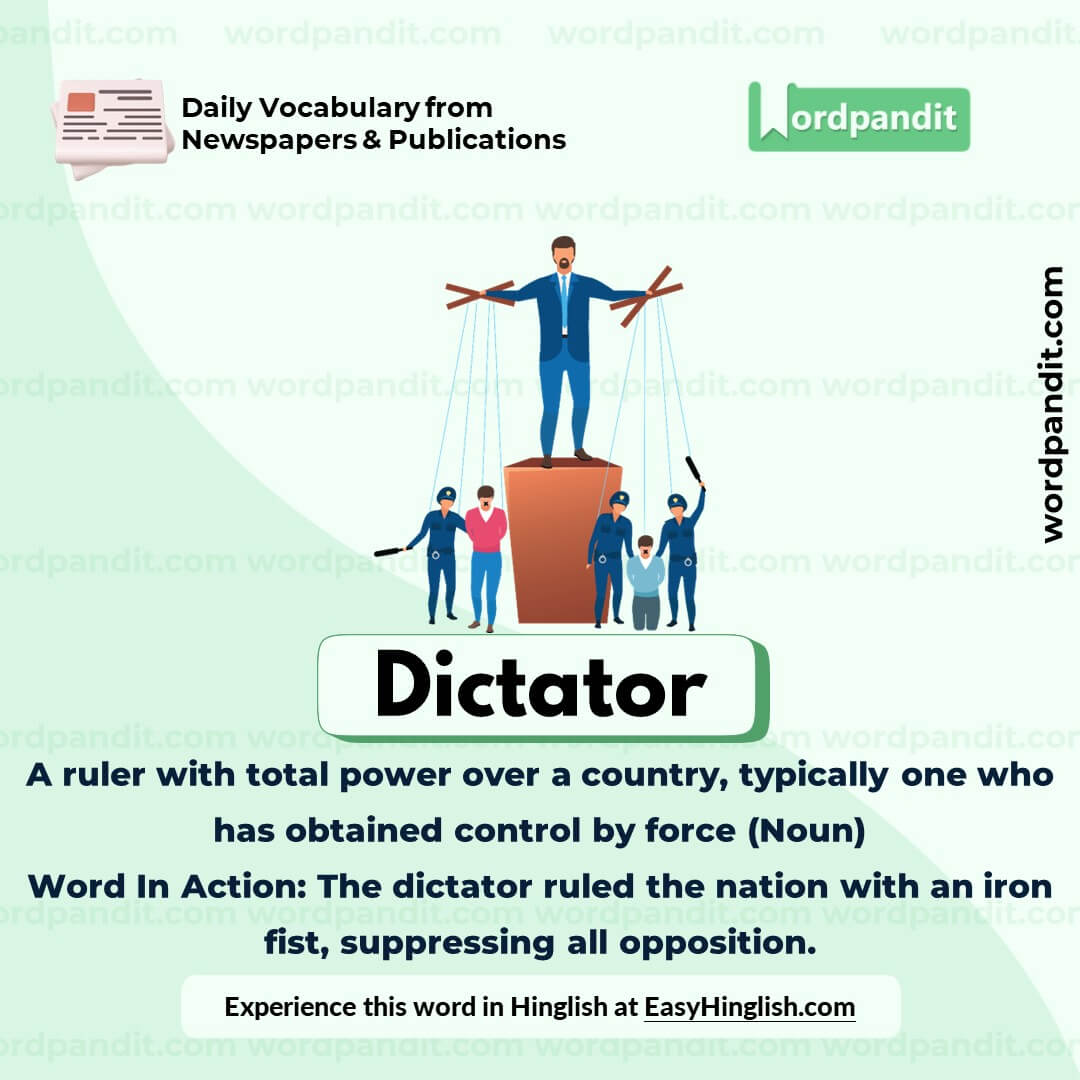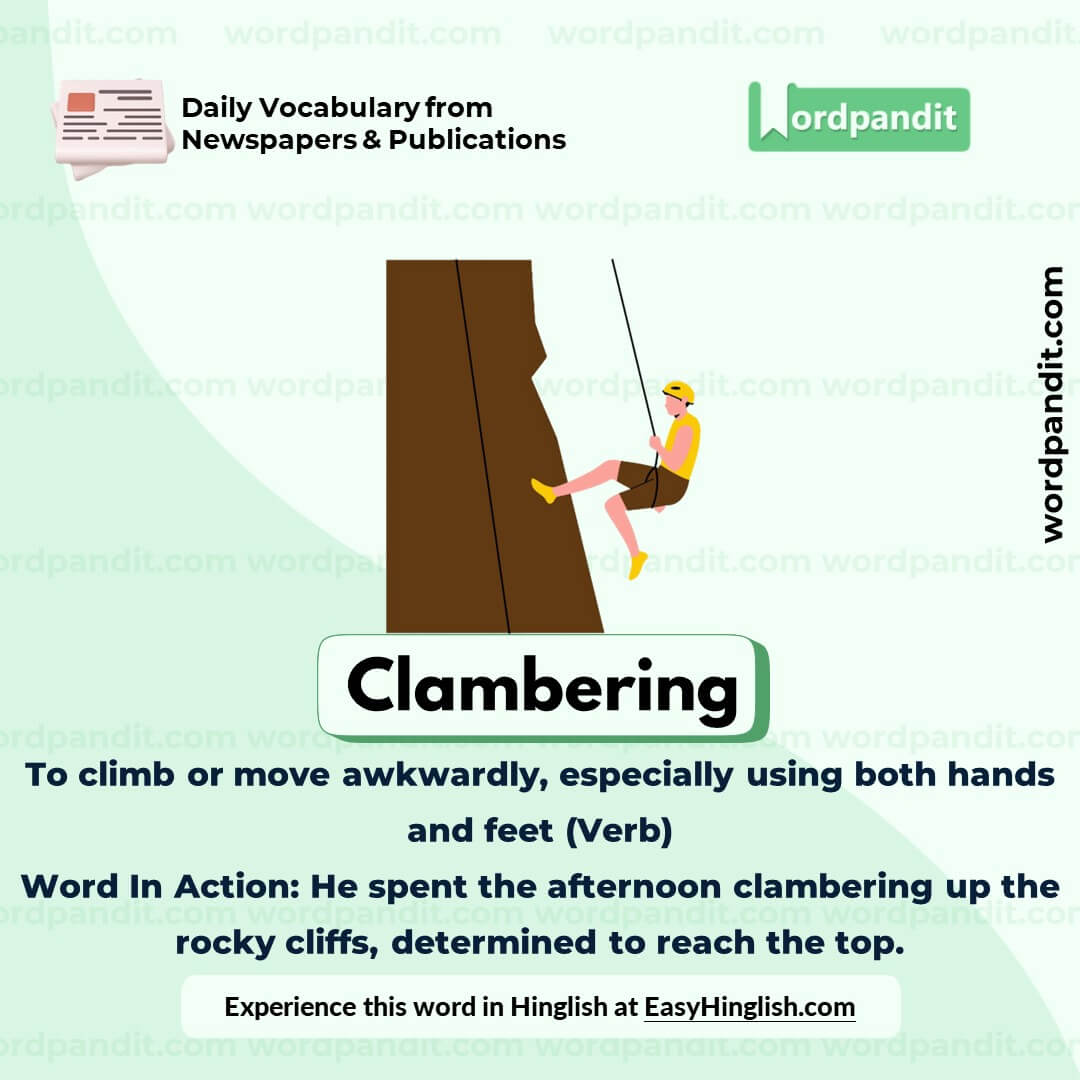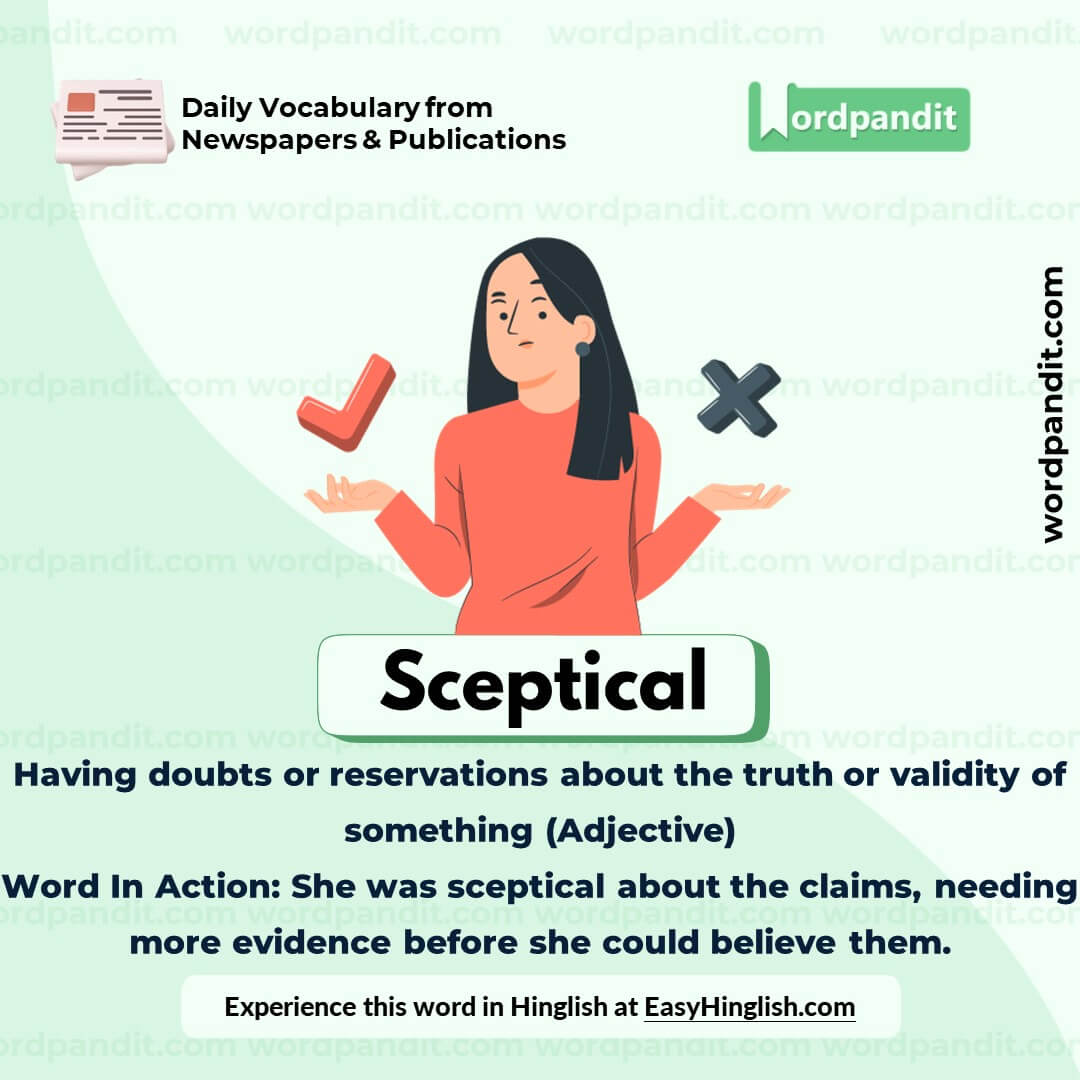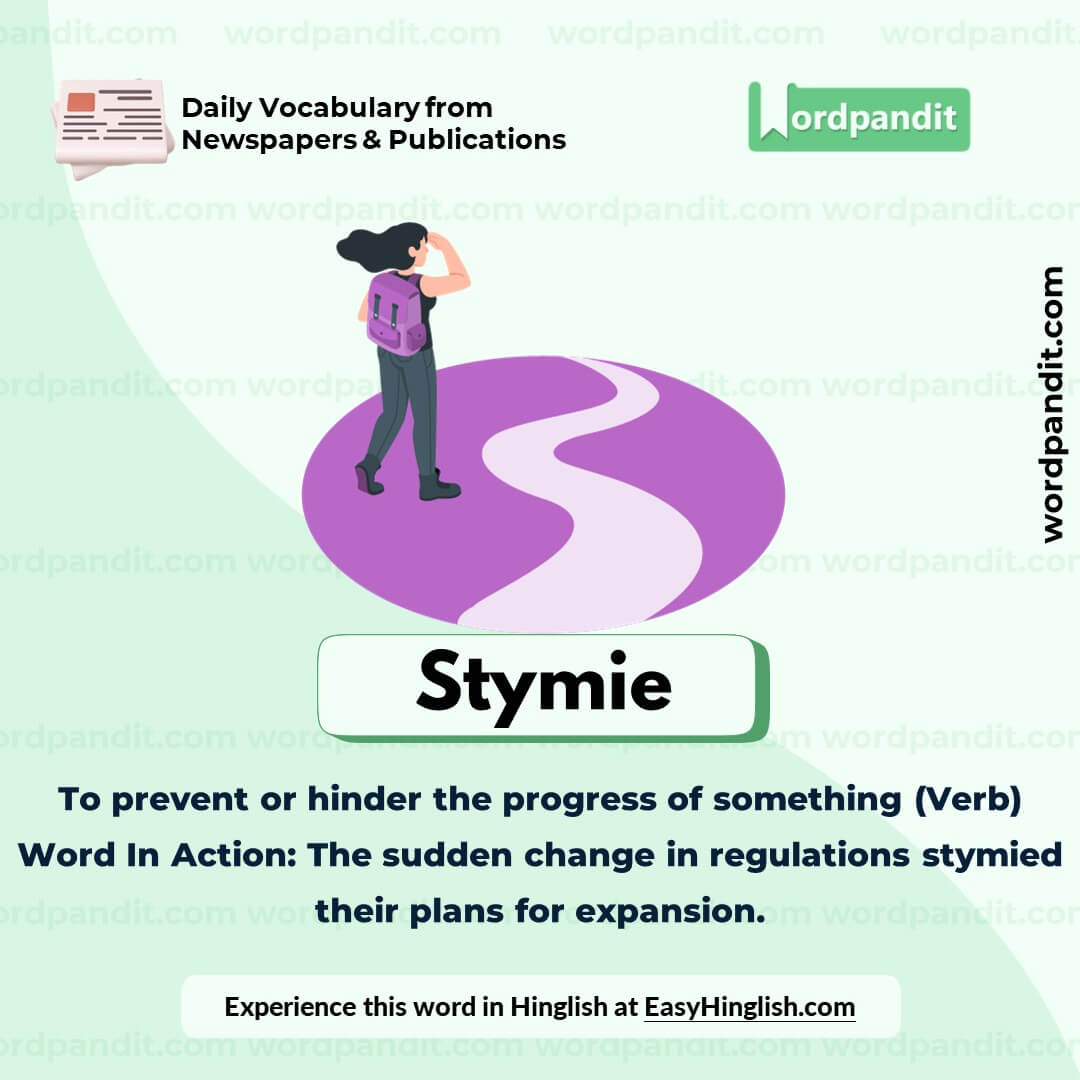Daily Vocabulary from International Newspapers and Publications
Expand Your Vocabulary with Wordpandit’s Global Vocabulary Hub
At Wordpandit, we are committed to helping you develop a truly global vocabulary by drawing from some of the most respected international publications. This section is designed to keep you ahead of the curve by introducing you to words that define global conversations and trends.
The Power of Global Sources
To help you think and communicate on a global scale, we curate vocabulary from renowned international sources, such as:
- The New York Times
- The Washington Post
- BBC
- The Guardian
- The Economist
- Scientific American
- Psychology Today
- And many more...
Stay Global, Stay Competitive
Our daily updates from international publications ensure you are consistently exposed to new words that reflect global news and developments, making sure your vocabulary is not only current but also globally relevant.
Enhance Your Global Perspective
Whether you’re preparing for international exams, aiming to excel in global business communication, or want to enhance your language skills for personal growth, Wordpandit offers the resources you need to thrive in a global context.
Effective Learning, Global Reach
Our learning methodology combines global examples, memory aids, and interactive activities, allowing you to internalize new words effectively and apply them in real-world scenarios.
Begin Your Global Vocabulary Journey Now!
Why Choose Wordpandit?
Practical Learning: Focus on words you'll actually encounter in real-world reading, enhancing your comprehension and communication skills.
Diverse Content: From current affairs to scientific breakthroughs, our varied sources expose you to vocabulary across multiple domains.
Effortless Integration: Make Wordpandit a part of your daily routine. Just a few minutes each day can significantly boost your lexicon over time.
Your Path to Vocabulary Mastery
- Visit our Daily Vocabulary section regularly
- Explore new words and their usage in context
- Practice incorporating these words into your own writing and speech
- Track your progress as your vocabulary expands
Start Your Journey Today
Embark on your vocabulary enhancement journey with Wordpandit. By consistently engaging with our daily posts, you'll build a robust vocabulary that serves you well in academic, professional, and personal contexts.
Remember, a word a day keeps linguistic limitations at bay. Make Wordpandit your daily companion in the quest for vocabulary excellence!
WORD-1: Dictator
Context:
"It was April 1960. Students had launched protests calling for the resignation of the dictatorial president Syngman Rhee." - BBC
Explanatory Paragraph:
A dictator is a leader who wields absolute power, often ruling a country in an authoritarian manner. Such individuals typically suppress opposition and may disregard democratic principles to maintain control. The term can carry a negative connotation, suggesting oppression or lack of freedoms under their rule.
Meaning: A ruler with total power over a country, typically one who has obtained control by force. (Noun)
Pronunciation: dik-tay-tor
Difficulty Level: ⭐⭐⭐ Intermediate
Etymology: From Latin "dictator," meaning "one who dictates" or "proclaims," originally a magistrate in ancient Rome appointed with absolute authority during emergencies.
Synonyms & Antonyms:
Synonyms: Tyrant, autocrat, despot, oppressor
Antonyms: Democrat, egalitarian, libertarian, servant-leader
Usage Examples:
- The dictator imposed strict curfews and curtailed freedom of speech.
- Many historians study the rise and fall of dictators in modern history.
- Under the dictator’s rule, dissent was met with severe punishment.
- Efforts to overthrow the dictator led to a long and bloody civil war.
Cultural Reference:
"The Great Dictator," a film by Charlie Chaplin, is a famous satirical take on authoritarian regimes, mocking the fascist leadership of the mid-20th century. - Public Domain Source
Think About It:
Why do some societies tolerate or even support dictators, while others strongly resist authoritarian rule?
Quick Activity:
Identify and list three historical dictators, noting the methods they used to gain and maintain power.
Memory Tip:
Remember "dictator" by associating it with "dictate"—a dictator dictates or controls everything without input from others.
Real-World Application:
Understanding the term "dictator" helps in analyzing political systems and recognizing signs of authoritarianism in governments, which is crucial for fostering democratic values.
WORD-2: Beacon
Context:
"South Korea is widely considered a peaceful beacon of democracy in Asia, but that wasn't always the case. This is a country that saw 16 bouts of martial law during its first four decades ruled largely by dictators." - BBC
Explanatory Paragraph:
A beacon is a source of guidance, inspiration, or warning. It is often used metaphorically to describe a person, place, or thing that stands out as a symbol of hope or progress. In a literal sense, a beacon refers to a light or signal that helps guide travelers or ships safely to their destination.
Meaning: A light or signal that acts as a guide, or something that serves as an example or inspiration. (Noun)
Pronunciation: bee-kuhn
Difficulty Level: ⭐⭐⭐ Intermediate
Etymology: From Old English "bēacn," meaning "sign" or "signal," derived from Proto-Germanic "baukną," meaning "signpost."
Synonyms & Antonyms:
Synonyms: Guiding light, signal, inspiration, emblem
Antonyms: Darkness, obscurity, deterrent, hindrance
Usage Examples:
- The lighthouse served as a beacon for ships navigating the treacherous waters.
- She became a beacon of hope for her community through her charitable work.
- The nation's constitution is regarded as a beacon of democracy and freedom.
- The beacon's steady light reassured the travelers during the stormy night.
Cultural Reference:
"The Statue of Liberty is often referred to as a beacon of freedom and hope, symbolizing welcome and opportunity for immigrants arriving in the United States." - National Park Service
Think About It:
What qualities make a person, organization, or country a beacon of hope for others?
Quick Activity:
List three modern examples of beacons of hope or inspiration in the world today and explain why they are considered as such.
Memory Tip:
Think of "beacon" as "be + icon," where an icon or light guides and inspires you, much like a beacon on a dark night.
Real-World Application:
The term "beacon" is widely used in discussions about leadership, innovation, and progress. For instance, companies or individuals leading in renewable energy are often called beacons of sustainability.
WORD-3: Clambering
Context:
"Almost immediately, lawmakers jumped out of bed and rushed to the national assembly, clambering over fences to reverse martial law." - BBC
Explanatory Paragraph:
Clambering refers to the act of climbing or scrambling over something in a way that requires effort, often using both hands and feet. It implies a hurried, awkward, or difficult movement, typically over an obstacle or rough terrain.
Meaning: To climb or move awkwardly, especially using both hands and feet. (Verb)
Pronunciation: klam-ber-ing
Difficulty Level: ⭐⭐⭐ Intermediate
Etymology: From Middle English "clambren," meaning "to climb," derived from Old English "clamb," related to "climb."
Synonyms & Antonyms:
Synonyms: Scramble, climb, scale, ascend
Antonyms: Descend, slide, glide, stroll
Usage Examples:
- The hikers were clambering over the rocky terrain to reach the summit.
- The children were clambering up the jungle gym at the playground.
- She clambered over the fence in a desperate attempt to escape the fire.
- The journalist clambered onto the roof to get a better view of the protest.
Cultural Reference:
In J.R.R. Tolkien's "The Lord of the Rings," characters often clamber over difficult terrains during their journey, reflecting their determination to overcome challenges. - Public Domain Source
Think About It:
What emotions or motivations drive people to clamber over obstacles, both physical and metaphorical?
Quick Activity:
Think of a time when you had to clamber over something in real life. Write a short paragraph describing your experience, using vivid verbs and adjectives.
Memory Tip:
Visualize "clambering" as climbing while scrambling, using "clam" (like clasping) and "ber" (from bear, which climbs).
Real-World Application:
Clambering is often used metaphorically in motivational talks to describe overcoming obstacles in life, emphasizing perseverance and effort in difficult situations.
WORD-4: Sceptical
Context:
"But as they continued watching Yoon's televised announcement, many grew sceptical. He gave no evidence of such forces at work, nor explained who they were." - BBC
Explanatory Paragraph:
Sceptical refers to an attitude of doubt or disbelief, often requiring strong evidence before accepting something as true. A sceptical person questions the validity of claims, theories, or explanations, especially when they appear unsubstantiated or unlikely.
Meaning: Having doubts or reservations about the truth or validity of something. (Adjective)
Pronunciation: skep-ti-kuhl
Difficulty Level: ⭐⭐⭐ Intermediate
Etymology: From Greek "skeptikos," meaning "thoughtful, inquiring," later adapted into Latin and French before entering English as "sceptical."
Synonyms & Antonyms:
Synonyms: Doubtful, questioning, dubious, unconvinced
Antonyms: Trusting, convinced, gullible, credulous
Usage Examples:
- The scientist was sceptical about the claims made without any supporting data.
- Despite the salesman’s assurances, she remained sceptical of the product’s effectiveness.
- Many voters are sceptical about promises made by politicians during campaigns.
- He gave a sceptical glance at the overambitious plan, questioning its feasibility.
Cultural Reference:
Scepticism was a central theme in Greek philosophy, particularly in the teachings of Pyrrho, who emphasized questioning beliefs to attain peace of mind. - Public Domain Source
Think About It:
How does being sceptical benefit individuals in evaluating information in the age of social media and misinformation?
Quick Activity:
Find a recent news story or claim and critically evaluate it. Write a few sentences on why you are sceptical or convinced about its validity.
Memory Tip:
Remember "sceptical" by associating it with "scope"—a sceptical person inspects or examines things closely before believing.
Real-World Application:
Scepticism is a crucial skill in today's world, helping people analyze claims, advertisements, and news to make informed decisions based on facts and evidence.
WORD-5: Stymie
Context:
"As Yoon had previously used similar language to describe the opposition that had been stymying his reforms, the public concluded he was actually trying to crush his political foes." - BBC
Explanatory Paragraph:
To stymie means to block, obstruct, or hinder progress or achievement. It is often used to describe situations where efforts are frustrated or stopped due to challenges, opposition, or unforeseen obstacles.
Meaning: To prevent or hinder the progress of something. (Verb)
Pronunciation: stai-mee
Difficulty Level: ⭐⭐⭐ Intermediate
Etymology: Originating in the early 19th century from golf terminology, where "stymie" referred to a situation where one player's ball blocked another's path to the hole.
Synonyms & Antonyms:
Synonyms: Block, hinder, impede, obstruct
Antonyms: Assist, facilitate, enable, aid
Usage Examples:
- The heavy rainfall stymied efforts to complete the construction project on time.
- Political infighting stymied the passing of the new legislation.
- The lack of funding stymied their plans to expand the business.
- She was determined to succeed, despite the challenges that stymied her progress.
Cultural Reference:
In golf, a "stymie" originally described a situation where one ball blocked another's direct path to the hole. This term evolved to signify broader forms of obstruction in various contexts. - Public Domain Source
Think About It:
What are some strategies individuals or organizations can use to overcome obstacles that stymie their goals?
Quick Activity:
Think of a time when you faced an obstacle that stymied your efforts. Write a brief description of how you overcame it or what you learned from the experience.
Memory Tip:
Think of "stymie" as "stop me." If something stymies you, it stops or blocks you from moving forward.
Real-World Application:
The word "stymie" is often used in discussions about policy-making, business strategies, and personal challenges, emphasizing the need to address and overcome obstacles effectively.















